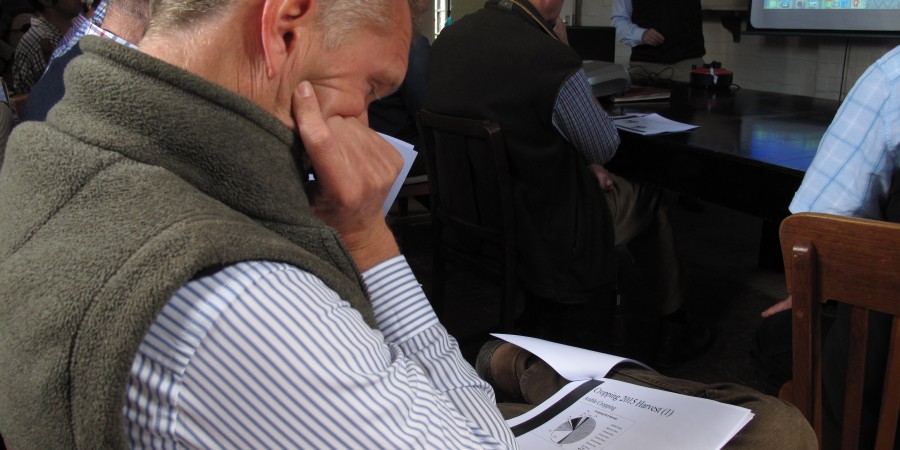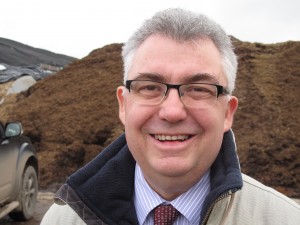All the member farm businesses in JVFG are always well aware of the context in which they operate. But that’s never been more important when being able to confidently predict the market, even a couple of years away, seems impossible. We asked a selection of JVFG members how they think Brexit will affect UK farming and to share what they are doing to strengthen their businesses – for whatever may lie ahead.
Finding a way to be future proof
Chris Middleditch Priory Farm, Wrentham near Southwold, Suffolk
“This exact question about how we are preparing for Brexit was posed to me the other day. My answer then was we need to future proof the business. As a contracting firm we are very vulnerable to Brexit and potential lack of subsidies. If we can perform in the most efficient, cost-effective way possible then we know we are in the best possible stance to take any economic problems or challenges that are coming our way .
Teresa May pledged to extend support payments however you never know what may be in store. We’re looking to make as efficient and viable business as possible to take into the future.”
Labour shortage looms large
OIiver Stratford, manager for the Hampshire part of the EC Drummond business

Olly Stratford, Farm Manager for EC Drummond in Wiltshire has labour on the top of his priority list.
“Our big challenge at the moment is labour. We are having quite high staff turnover. We have two young guys who have come in and both have been with us for two years. One was a placement student for a year before that so he has now done three years and he has moved on this autumn. The other did 12 months and then moved on. Keep hold of good people is hard.
You take a bit of a punt on a youngsters and hope they will stick around. But there’s a lot of ambition out there. I see it in myself and others my age. So it’s about trying to look after those youngsters or find someone who wants to commit to the area and settle down but it has its challenges. This is what we have to master to be ready for Brexit.”
Prepared for positives and negatives
James Thorp of A.G. Wright and Son (Farms) Ltd, Ely. Cambridgeshire.
“What are things going to be like in three years time? No idea. Nobody can answer that question. Not a politician, not a farmer, no-one can answer that question accurately. I have just explained to my board that as a business we have to be able to roll with a few punches. All we can do is have the business in the right place with the right cost level for whatever is thrown at us.
There will be negatives and positives: that much we can forsee. We have to be placed to make the most of the positives or roll with the negatives. But we cannot predict with any certainty what is going to happen in the next three years.”
Opportunities opening up
James Hamilton, of Granta Farming, Essex
“The next 3 years are going to be really interesting. Yes, there are going to be a lot of opportunities. We are going to have be very nimble on our feet to make sure the we don’t get caught out by inevitable negative changes.
Joint ventures are definitely going to have a big part to play. I can see a lot more people looking at them and likely to form new joint ventures of their own, if existing joint ventures nearby do not appeal. Especially for younger people, with succession into the farm, and where the rest of the family shareholders want to to go that way.”
Change of mindset needed
Jamie Symington of L.Symington Farms, Norfolk
“There are going to be some fantastic opportunities over the next 3 years. People who have had enough are going to be leaving the industry. Those of us who understand our costs and are at the top of our game are going to have opportunities to expand.
The prescriptive mindset that many farmers have at the moment – the ‘this is what I always do” attitude – is all going to change. Farmers will have to become much more flexible in their approach.”
Expanding the business but with care
Tim Merry, JV Farming, Dorset
“You want me to look into a crystal ball? Overall what I see for JV Farming is that the future is bright. The next three years has got potential for us. We are in discussions with prospective new customers and I think those opportunities will increase. We have been hearing in JVFG how some joint venture businesses are shrinking but our net acreage is increasing per year. However there will come a point when we have to decide how much more we want to grow.
To maintain that attention to detail, that control and high quality of service we offer to our members, we have to ask how much more can I, as manager, do before I need an assistant? How do we get the right assistant? Then we, like others in JVFG, come round to staffing issues.
Overall though, for large businesses such as joint ventures, the potential is there and I see good times ahead.”
Be sure not to crack under the pressure
Jamie Gwatkin, JVFG consultant
“My feeling about the next 3 years is that financially it’s going to get harder. I think that people are going to have to look at their cost structures very, very closely. I believe joint ventures are going to come even more into vogue than they have been previously.
As sure as eggs are eggs it’s going to be uncertain for the next 3 years and the economy as a whole is going to struggle over the next 18 months.
JVFG farm businesses are always well aware of the context in which they operate. But that’s never been more important than now when being able to confidently predict the market even a couple of years away seems impossible. We asked a selection of JVFG members how they think Brexit will affect farming and to share what they are doing to strengthen their businesses, for whatever may lie ahead.”







